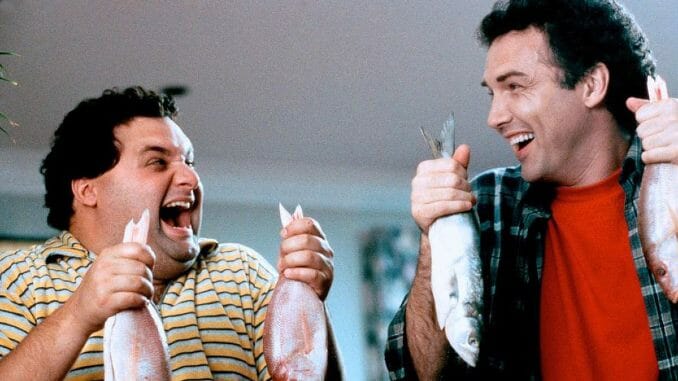Bob Saget and Norm Macdonald Championed Bad Taste in Dirty Work

A great stand up…knows that bombing doesn’t matter. Bombing is part of the art, part of the performance of it…If you can offend people and still get laughs, you’re in some kind of real special ethos.
So said the late Bob Saget, who passed away last week at age 65, of Norm Macdonald in a tribute episode of Bob Saget’s Here For You after Macdonald died in September 2021. But this “special ethos” also applies to Saget’s 1998 directorial debut Dirty Work, made in collaboration with Macdonald, the film’s co-writer and star.
A buddy comedy about down and out best friends Mitch (Norm Macdonald) and Sam (Artie Lange) who open a “revenge for hire” business in order to get the money for Pops’ (Jack Warden) exorbitantly priced heart transplant, Dirty Work was a massive critical and commercial flop. It bombed so badly that Saget, who was always proud of the project despite its status as a failure, even claimed to have received a personal bill for $30 million from MGM. Maybe Dirty Work bombed—maybe Saget and Macdonald offended people with their crass, politically incorrect brand of humor—but they certainly got plenty of laughs. In the decades since its release, Dirty Work has rightly earned its place in the comedy cult classic hall of fame for its stacked lineup of comedy legends (Don Rickles, Chevy Chase, Chris Farley in his final film appearance and an uncredited young Adam Sandler as Satan, to name a few) and sheer concentration of well-timed jokes per minute.
Critics’ main issue with Dirty Work was that the jokes were too lowbrow, too “terminally stupid and brain dead,” to quote the New York Times review. Sure, the humor is crude, low class and not aiming for levels of intelligence much higher than that of the seventh grade, but that doesn’t mean they’re not funny as hell. Mitch gets revenge on cruel car salesman Anton Phillips (David Koechner) by interrupting the live shooting of his commercial by hiring sex workers to play dead in the trunks; thanks to Saget’s keen directorial timing and Macdonald’s dry delivery, Mitch and Phillips play dead prostitute whack-a-mole, popping trunks open and closed, trying to prove their respective points.
Critics failed to see that it’s this dynamite combination of Saget’s brash cheekiness and Macdonald’s sneaky, dimpled charm that makes them soar. Another one of Dirty Work’s most famous gags involves Mitch and Sam planting fish around a house for a client, only to be interrupted by two warring drug gangs who take the fish scent as a signal to start killing each other; instead of showing the violence, the camera never leaves Mitch and Sam’s gleeful expressions, turning to horror in the other room as they realize the destruction they’ve caused. The question of whether Saget’s decision to use off-screen space and sound was made out of financial necessity or artistic expression is irrelevant because the gag lands so smoothly.
Another possible explanation for critics’ initial dislike for Dirty Work could be that the joke was on them, and Saget didn’t care much if they “got” the joke or not. Although it would be inaccurate to say that all of Dirty Work’s jokes are punching up—Saget and Macdonald take more of an “aim at everyone including themselves” approach—many of the jokes are aimed at high art, and those who can afford to enjoy it. For their final act of revenge against Travis Cole (Christopher McDonald), the wealthy real estate tycoon who screwed them over, Mitch and Sam lead a stampede of prostitutes, homeless guys and skunks through Cole’s opera house on opening night of Don Giovanni. “They’re using skunks to heighten the atmosphere of squalor and despair. Brilliant!” exclaims one opera critic as hoards of well-dressed operagoers flee the scene.
“You’re ruining Don Giovanni!” Cole laments to Mitch. “Don Giovanni? Who’s that dude?” Mitch asks, genuinely puzzled. “The opera! You’re ruining the opera!” cries Cole. “Oh yes, well, we are ruining that,” Mitch responds blithely.
-

-

-

-

-

-

-

-

-

-

-

-

-

-

-

-

-

-

-

-

-

-

-

-

-

-

-

-

-

-

-

-

-

-

-

-

-

-

-

-








































